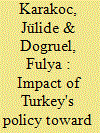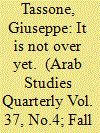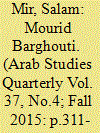|
|
|
Sort Order |
|
|
|
Items / Page
|
|
|
|
|
|
|
| Srl | Item |
| 1 |
ID:
143130


|
|
|
|
|
| Summary/Abstract |
Turkey's changing policy toward Syria since the start of the Syrian uprisings in March 2011 has had major cultural, economic, social, and political implications for the people of the city of Hatay, which is located on the Turkey-Syria border and is home to people of diverse ethnicities and religions. This article explores how the problematic relations between Syria and Turkey following the uprisings in Syria have shaped perceptions of human security, examining in particular the impact of the discourse used and the policies followed by Turkey during the civil war in Syria on the security perceptions of the people of Hatay. It is suggested that Turkey's policy toward Syria and the resulting social, economic, and political repercussions for Hatay have fueled perceptions of insecurity for both Syrian refugees and the residents of the city.
|
|
|
|
|
|
|
|
|
|
|
|
|
|
|
|
| 2 |
ID:
143129


|
|
|
|
|
| Summary/Abstract |
In their assessment of the recent revolutionary turmoil in the Middle East, Hamid Dabashi and Tariq Ramadan argue that the Arab Revolution has opened up for the Arab peoples the possibility of reconnecting themselves with their own history. In their view, there is a creative potential in the Orient itself to question, from within its own tradition, the practices and conceptual categories by which the West has objectified it, so as to produce something new and original. In this article, I contend that Dabashi's and Ramadan's appeal to the Arab cultural tradition as a source of meaning for reconstructing Arab societies is a form of culturalization of politics that blots out the role played by political economy in the Arab Revolution. To gain a theoretical grip on this question, I suggest that the ties between culture and politics be severed and, in their place, the connection between the political and the economic be restored.
|
|
|
|
|
|
|
|
|
|
|
|
|
|
|
|
| 3 |
ID:
143128


|
|
|
|
|
| Summary/Abstract |
Although the reputation of poet Mourid Barghouti (b. 1944) in the west rests on two personal memoirs, this article suggests that Barghouti's poetry deserves equal recognition. The long poem in Midnight and Other Poems (2005), the subject of this article, wrestles with the options of the modern exile. Suffused with memory, I argue that Midnight opens a creative window out of multiple historical sites and personal encounters that interrogates the notions of modernity and progress, victory and loss, and nationalism and patriotism. Out of political dilemmas emerge a beauty in words of resistance and defiance, “guns of mutiny” with deep ethical responsibility toward humanity. From within spiritual orphanage and alienation, Barghouti constructs clear, concrete poetry, an aesthetic that articulates the Palestinian memory, crossing borders of history, geography, and literary traditions. Midnight's tender poetic images reposition the Palestinian exile alongside other unique voices worldwide within memory studies.
|
|
|
|
|
|
|
|
|
|
|
|
|
|
|
|
| 4 |
ID:
143131


|
|
|
|
|
| Summary/Abstract |
The final two weeks of September 1918 were crucial for the modern history of Damascus. They marked exodus of the Ottoman Turks and entry of the Allied Forces, yet they have received mediocre attention from World War I historians. Most literature on the Great War in the Middle East covers British strategies in the Arab Revolt and Hashemite ambitions, revolving around the characters of T. E. Lawrence and Sharif Faisal. Most cover the years 1916–18, or the British-backed Arab government that was established on October 1, 1918, the day Lawrence entered Damascus. Never has scholarly attention been given as to what happened inside the city itself during these two weeks that preceded October 1, or to the community leaders who teamed up to protect Damascus from uncontrollable chaos that threatened to tear the city apart. This article looks at the two weeks inside the city, namely through one protagonist, being the self-appointed governor of Damascus, Emir Said El Djazairi.
|
|
|
|
|
|
|
|
|
|
|
|
|
|
|
|
|
|
|
|
|